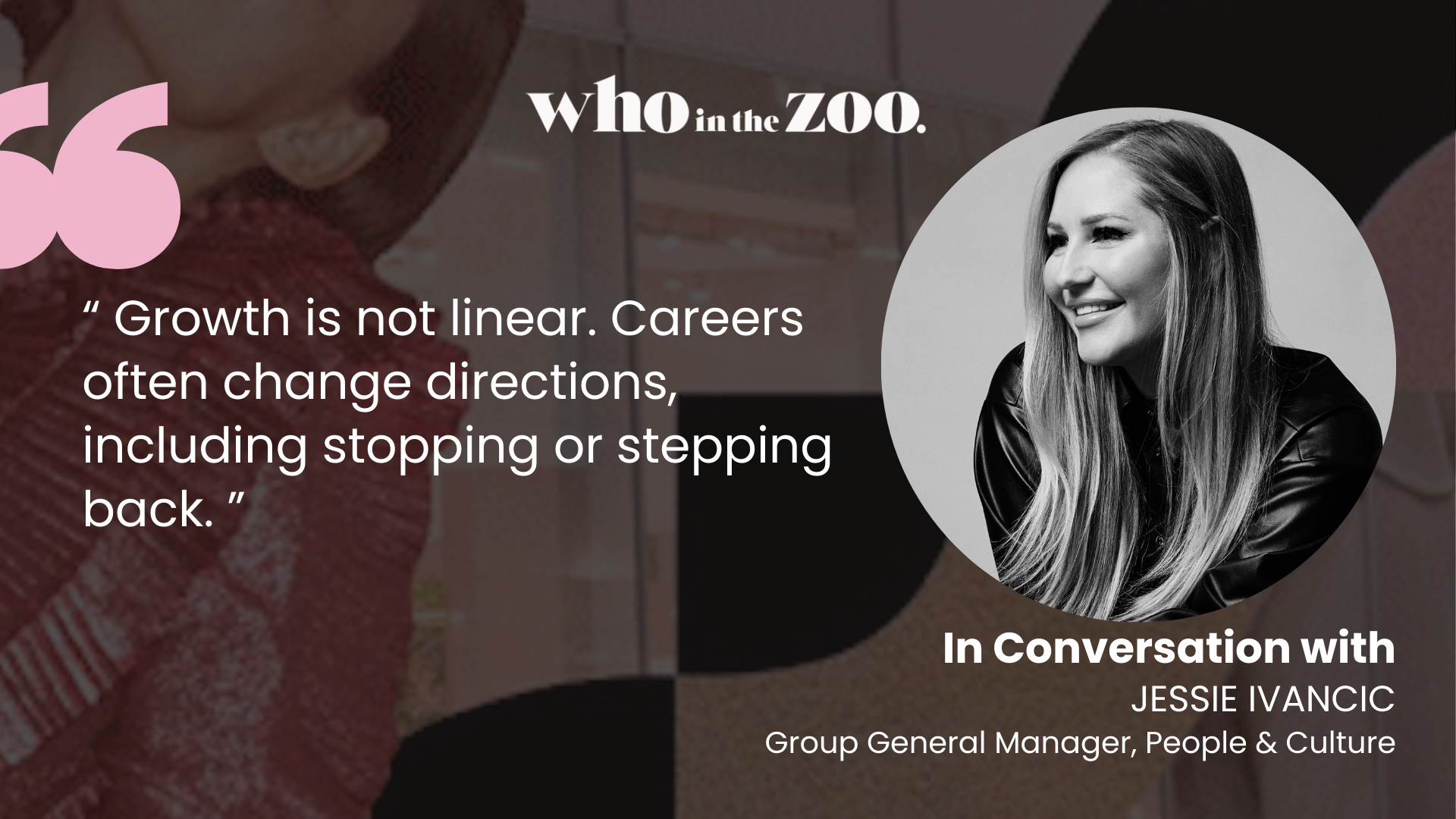IN CONVERSATION WITH Jessie Ivancic
For this week’s ❞𝐈𝐧 𝐂𝐨𝐧𝐯𝐞𝐫𝐬𝐚𝐭𝐢𝐨𝐧 𝐖𝐢𝐭𝐡❞, we introduce Jessie Ivancic, a seasoned People & Culture Executive with a rich retail leadership legacy. Her interview with our Director, Sue Di Chio, delves into navigating career challenges, embracing change, and empowering women in the workplace.
Jessie Ivancic shares wisdom on HR misconceptions, leadership, and overcoming unforeseen circumstances.
Insights from a Retail HR Executive, Jessie Ivancic
Jessie Ivancic is a People & Culture Executive with a retail leadership legacy across large businesses such as STA Travel, Myer, and, most recently, as the Group General Manager of People & Culture at Brand Collective (27 brands). She speaks with us candidly about retail human resources and recruitment trends, embracing setbacks, leadership, and careers.
What are the biggest misconceptions of HR professionals, and how much has the role changed in the past few years?
Engagement is a crucial driver of business performance. But ensuring you have fun at work isn't the responsibility of HR. Yes, we organise the office celebrations, but the meat of HR isn't visible to most people. Engagement is a product of shared purpose, connecting team efforts to business results, values alignment, clear and supportive leadership, and trust. Building this is thankless, behind-the-scenes work with leaders. We aren't entertainers; we're transformational from the inside out.
Contemporary leadership requires managers at every level to actively participate in the engagement of their team members.
Post lockdowns across major Australian markets in 2022, SEEK reported the job market's largest gap between record-high job advertisements and record-low applications per advert. The lasting impact of this swing in workplace economics, plus a few other assisting contributors such as generational workforce participation, has balanced the scales of the employment relationship. Gone are the days when employees were just considered lucky to have their jobs.
The conventional 'open door policy' of being available to team members to seek guidance on an issue when the issue has already come to exist is no longer sufficient.
Successful people leaders proactively invest 20% of their time into mentoring, making the work meaningful, contributing to the team member's individual goals, and creating space for them to speak freely while the leader steps back to listen. Leaders must accept their management obligations have been fundamentally altered. Just like checking your emails first thing every Monday morning, making time to cultivate engagement is a daily task that contributes to increased performance.
Transitioning to the topic of leadership, as a seasoned People Executive, what do you believe are the most important qualities or attributes that make a successful People & Culture leader, especially in navigating through times of change?
Vulnerability and authenticity to foster trust,
Compassion and respect for the experience of others
Integrity to do the right thing, when no one is looking or when you know it is unpopular,
Humility to change your mind,
Curiosity to truly understand the business beyond HR, particularly the commercial interests and performance, and,
Agility to changing business priorities and macro environmental influences.
You've recently begun your job search; what advice can you give our followers about managing periods of uncertainty and securing your next challenge?
Many years of giving career coaching and having large, high-performing talent acquisition teams hiring ~4,500 annually in the fashion and retail industry under my remit have taught me that growth is not linear. Careers often change directions, including stopping or stepping back. This is particularly true for women.
Periods of forced career breaks happen. Whether it be necessary for your family obligations, a redundancy, or as in my recent situation, the legitimate prerogative of a new CEO, most of us will have this experience in our careers.
Executives are particularly vulnerable, experiencing forced change three times in a career, thanks to being unprotected by the employer obligations of reason and process under unfair dismissal legislation afforded to others. For those with goals of reaching the top of the tree, you have to accept this as par for the course. I have had the displeasure of being on both sides of the table for these conversations. My advice for anyone entering an Executive appointment is to ensure you negotiate the terms of your agreement with consideration to your compensation being a fair trade-off to your loss of access to termination for fair cause and process.
Turning setbacks into opportunities for growth is a powerful mindset to adopt. Can you share any lessons or insights that you gained from that experience?
In 2024, workforce mobility is high; people are moving jobs often, meaning a reduced stigma and a healthy churn of fresh opportunities to market. Movement creates movement. The new working generation, Gen Z, can expect to work 16-17 jobs in an average 45-year career.
You will secure a new role. Until such time, you've been given the space for a reset. Here are my three rules to reset.
Be emotional: Change like this can be a punch to the gut. Self-awareness is your ability to perceive your own emotions in the moment accurately, and it requires the willingness to tolerate the discomfort of focusing on feelings that may be negative. A pillar of Emotional Intelligence and a developable skill, high self-awareness is directly attributed to top performers – Dr. Travis Bradberry & Dr Jean Greaves explain more in their book Emotional Intelligence 2.0. Sink into the emotion. Take some time to indulge in processing your feelings and making sense of the situation so you can bring the psychological contract to a close. New chapter, here we come!
Find the development: What have you learned? One of the best learning experiences of my career was navigating a Voluntary Administration; the exposure to liquidity ratios and winding up procedures with a big professional services firm gave me business acumen and learnings beyond my degree & traditional HR practice. One day, a recruiter will ask you to tell them about a time you've overcome adversity. Voila. You have this in your back pocket.
Take the opportunity: Get acquainted with the boundaries of your circle of influence (see Stephen M. R. Covey definition in The 7 Habits of Highly Effective People if you are unfamiliar). Macroeconomic conditions, a newly appointed CEO's prerogatives – these all fall well outside it. Instead, get energised by what is inside of your control, such as:
Celebrating your achievements in a new CV;
Your unique proposition. In 2 sentences, answer these simple questions: who are you? What do you do? What makes you different? Learn to articulate your proposition. You are the expert on you. It isn't up to anyone else to sell you; you have to get comfortable speaking confidently about your skills. Practice it in the mirror so it rolls off your tongue when you're networking or interviewing in the future.
Explore what you want in your career. Plot your next move so you can target opportunities consciously. How? I like to imagine a camera lens zooming out from the micro to the macro. To examine the micro, consider using a model such as the Three-Dimensional Analysis in Ann Rolfe's The Mentor's Toolkit for Career Conversations, which includes the nature of the work, employment environment, and lifestyle preferences. Then, think critically about what industries/sectors and potentially brands/businesses are consistent with those desires. Consider the size of turnover in dollars, the team size you work in, and the business model so that when those opportunities come up, you can identify them. What aspects of your skills or experience align with these attributes? Articulate that in your cover letter when it comes time to apply.
And connect! Nurture your professional connections—network, network, network. Put your heels on and head into the city for a coffee. Put your hand out first and initiate contact with like-minded or complementary professionals and businesses. Create opportunities for your peers; if you know of a role that isn't for you, maybe you can make an introduction. Make yourself known to people and companies with similar interests, conversations create opportunity. Don't have a networking group? Create one! Reach out and table a common challenge and ask them how they approach it. Share what you have learned.
In recognition of International Women's Month and our high female industry participation, what advice can you give your fellow females in their careers?
Doubting yourself is normal. The Dunning-Kruger effect suggests high performers tend to underestimate their skills. Think critically. Maintain humility. But don't be paralysed by self-doubt. No one knows what they are doing until we have to do it.
I must caveat my second point with the declaration that I am not a certified financial advisor. Rather, I am an HR Exec with an appreciation for the economic disadvantage of women and a sense of strong personal responsibility to do whatever I can to contribute to closing the superannuation gap that exists in Australia.
For those mothers weighing up whether it is worth bringing in a second income when daycare costs so much, my view is that it is. The simple equation of income – expenses might not be enticing, but the impact on your superannuation can be life-changing. Did you know a $10k loss in super near the beginning of your career could cost you $200k at the time you retire? Not to mention, remaining in the workforce will expose you to more opportunities for career growth, maintain your confidence in your craft, and keep your skills current to market - all adding to your future earning capacity.
Pick up a copy of Dr. Lois Frankel's Nice Girls Still Don't Get The Corner Office: Unconscious Mistakes Women Make That Sabotage Their Careers for more.

